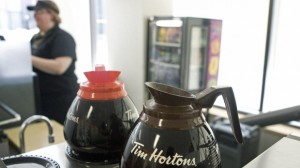An Ottawa man donated cash for the equivalent of hundreds of Tim Hortons coffees, as well as some breakfasts, making it the third identical gesture in Canada this week.—cbcnews
The donation, given by an unnamed worker for OC Transpo, ran out in just over an hour, though. This comes after a “mystery man” gave a downtown Edmonton Tim Hortons about $900 on Monday of that week and another person gave the same amount to a Calgary location on Wednesday that week.
When first time heard the news, I realized that it may have some connections between those donations, as what I thought, the newspapers reported that there was some debate over whether these acts were hidden moves by Tim Hortons for publicity, but the company sternly denied that.
Whether it was donated by the individials or acted by the Tim Hortons itself, the Take-up did advertised fot the Tim Hortons because it caused a social attention. What’s more, the action itself helps to improve the brand image by the take-up coffee.



